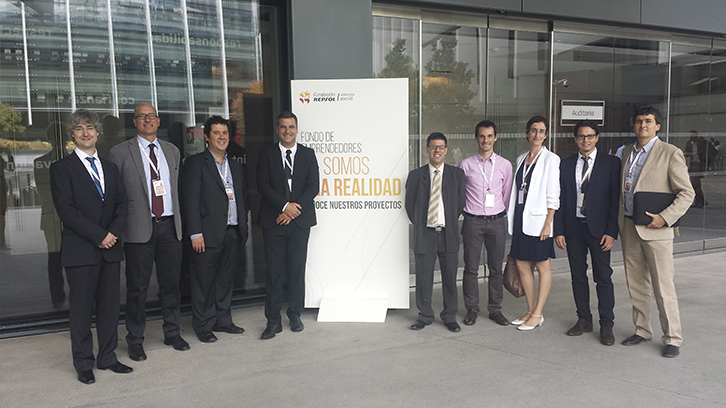Four projects from the Esfera UAB-CEI awarded Repsol Entrepreneurs Fund grants

On 11 September Fundación Repsol announced the names of the nine winners of the 2015 Entrepreneurs Fund grants, now in their fourth year. This is an incubator for business projects aimed at finding innovative solutions in the field of energy efficiency and energy saving.
The grants fall into two categories: one for consolidated business projects and the other for ideas that still need to go through a maturing process.
The four successful projects, chosen from among over 200 entries, will get a grant of up to 288,000 Euros over a maximum two years. As for the five ideas that were selected, these will get 24,000 Euros over one year. The nine winners will also be allocated a team of tutors, specific training and technical and legal advisors. Additionally, they will have office space in the Repsol Technology Centre.
Four winners from the Esfera UAB-CEI
Of the nine projects awarded grants in the current edition of the Entrepreneurs Fund, four were submitted by researchers and entrepreneurs at the Esfera UAB-CEI. Energy Harvesting, Solar Oxides, Siterm and Fuelium are the four projects selected. They stand out for their high levels of quality and innovation and they all seek greater energy efficiency in various areas: from energy production to energy distribution and use.
After being incubated over a year as an idea, Energy Harvesting has once again won a Repsol award, this time as a consolidated project. It is a technology for recovering waste heat from industrial processes and using it as energy. The project was developed by Raúl Aragonès, Carles Ferrer and Roger Malet, researchers from the UAB School of Engineering, and promoters of the spin-off AEInnova.
The project Solar Oxides focuses on manufacturing photovoltaic solar cells through 3D printing. Conductive oxides, a non-toxic, stable, and low-cost material found abundantly in nature, are used for this process. The cells were designed by the researchers Alberto Calleja and Xavier Sintas, from the company Oxolutia, a spin-off from the Institute of Materials Science of Barcelona (ICMAB CSIC).
The Fuelium idea, from researchers Neus Sabaté, Sergi Gassó and Juan Pablo Esquivel of the Institute of Microelectronics of Barcelona (IMB-CNM CSIC), is for batteries made of paper that can power a wide range of single-use devices, such as portable diagnostic devices. Unlike normal batteries, these only generate the amount of energy needed for each application and they do not contain harmful heavy metals. Their main components are paper, carbon, and biodegradable metals.
The proposal by Siterm focuses on the detection of gas leaks by autonomous thermal microsensors fitted inside the pipes. These sensors are innovative because they use the pipe's residual heat to produce the amount of energy needed for self-supply, which reduces costs and maintenance needs. The team behind this project is made up of researchers Javier Rodríguez Viejo and Aitor Lopeandia, of the UAB Department of Physics, Llibertat Abad and Francesc Xavier Muñoz Pascual, of the 'IMB-CNM and Antonio López, of the Universitat Politècnica de Catalunya-BarcelonaTech (UPC).

